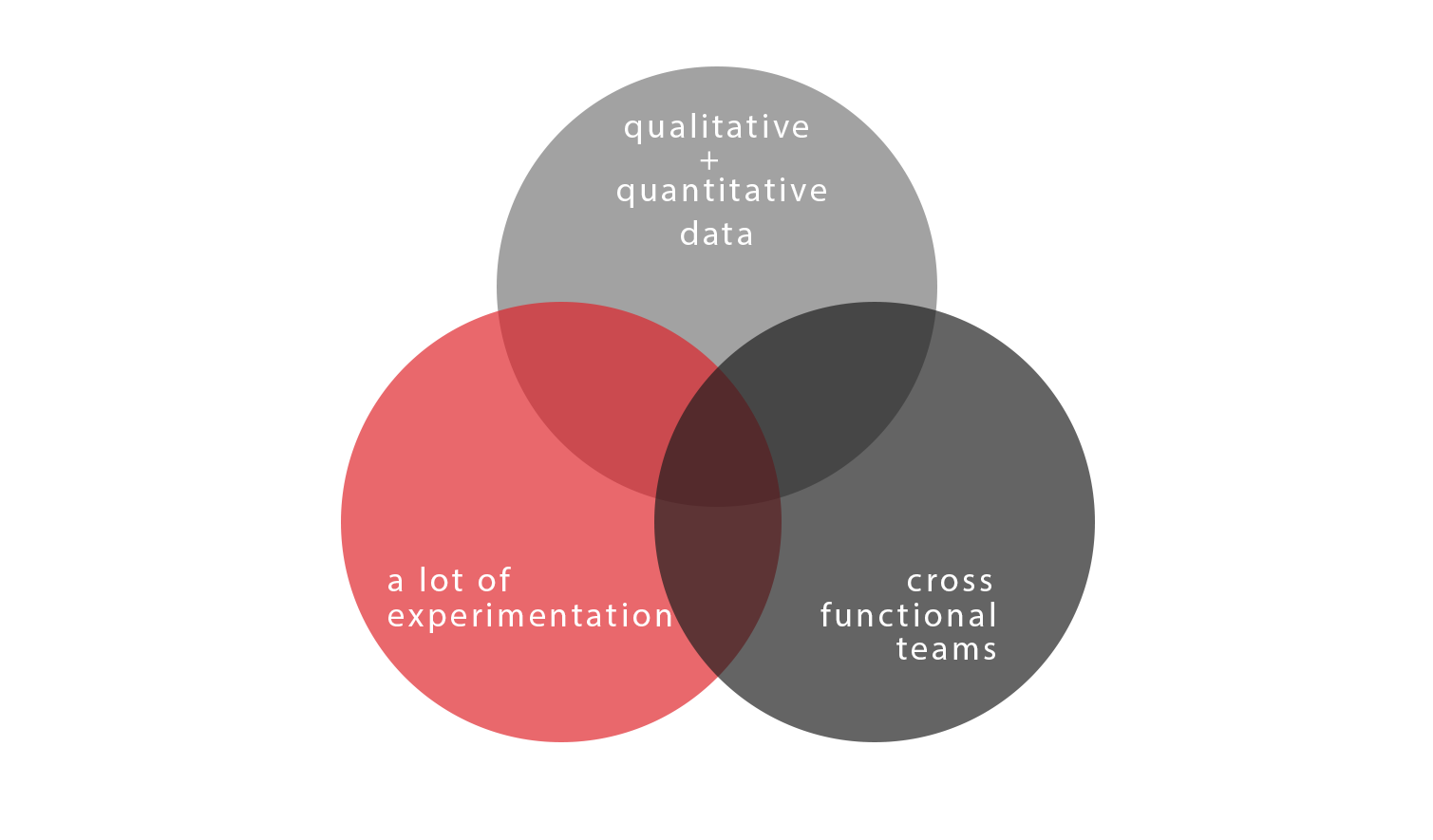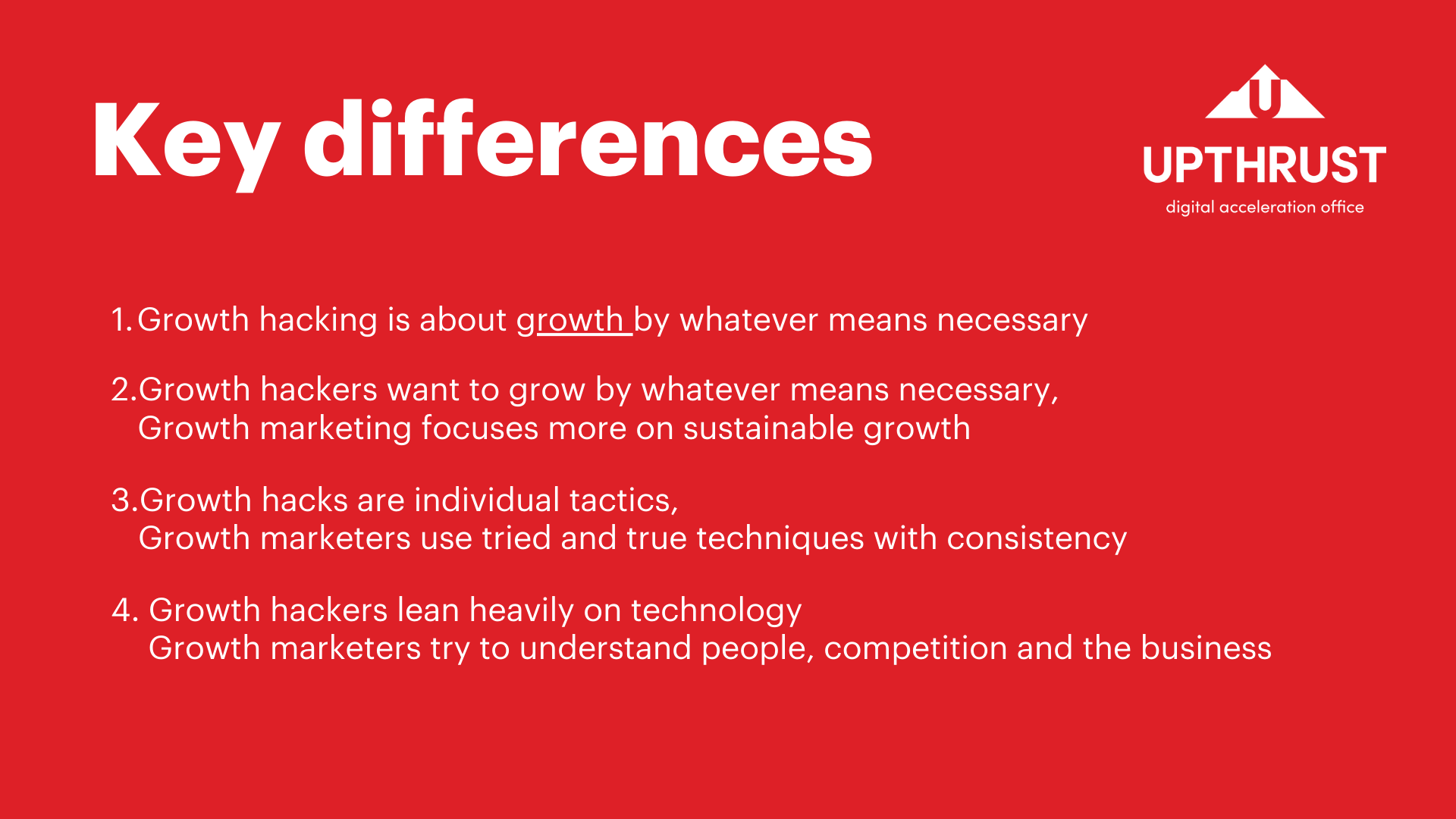Growth Marketing vs Growth Hacking

Growth hacking and growth marketing are two buzzwords being used in the business and marketing worlds today. But the problem with buzzwords is that they’re often so new that they’re not properly defined. Often, this leads to words being used interchangeably when, in fact, there are stark differences.
In short, growth hacking is the use of data-driven experimentation to grow a company in any way possible. Growth marketing—or evolved traditional marketing depending on who you speak to—uses a systematic process with multiple strategies to build brands, acquire customers and encourage them to tell others about a product.
Those two brief profiles probably create more questions than answers. So let’s clear up some of the misconceptions about growth hacking and provide clarification for those trying to differentiate between growth marketing and growth hacking.
Do you want to know how we can Growth Hack your Business ? Plan a FREE strategic session HERE!
Defining Growth Marketing and Growth Hacking
Before looking at key differences and comparing the two terms, let’s define them and identify their focus.
Growth Hacking
Growth hacking was coined in 2015 by Sean Ellis of Dropbox fame. He coined the term to describe a process for creating rapid-growth tactics for startups through experimentation. Here are the key focuses of growth hacking:
- Utilizes both qualitative and quantitative data to identify behavior profiles and customer preferences
- Implements cross-functional teams using marketing and product skills.
- Uses a lot of experimentation and with a heavy focus on metrics; then evaluates and takes action with the results.

Growth hacking focuses solely on growth. So while the concept does place value on customer acquisition, it also focuses on retaining and monetizing customers for the long term. Any experiment that grows the company is a growth hack.
Growth Marketing or Traditional Marketing 2.0
On the other side, growth marketing is oriented toward finding good customers who fit a company’s ideal profile and figuring out how to help them so they purchase again and tell others about the product. Here are some key points for growth marketing:
- Growth marketers use brand marketing to differentiate a product or company from the competition and create content and paid ads to retain and encourage customers to tell others.
- Growth hacks are used by growth marketers in a systematic way that finds ways to implement them based on long-term impacts.
- Has a heavy focus on sustainable, long-term growth instead of rapid growth.
There are some obvious similarities between growth hacking and growth marketing. Both concepts aim to acquire new customers and monetize them for the long-term, and they both utilize data and experimentation to achieve their goals. But there are some key differences that will help you tell them apart.
What are the differences?
There are four key differences between growth hacking and growth marketing:

- Growth hacking is about growth by whatever means necessary, which means they don’t have much of a focus on the brand. Whereas, growth marketing is all about building the brand, and it’s hard to put data on tactics related to brand marketing.
- Growth hackers want to grow by whatever means necessary, and they also want to do it very quickly. So, the long-term aspects of their growth plans often lose focus. Growth marketing focuses more on sustainable growth and every action is focused on that primary goal.
- Growth hacks are individual tactics that, while often ingenious, don’t work as well the second or third time when other companies start to catch on. Growth marketers use tried and true techniques with consistency for growth—think of The Little Engine that Could.
- Growth hackers lean heavily on technology, which is why their role—as you’ll see later—has so many technical prerequisites. Growth marketers understand people, competition, and the business as it exists in the real world.
Role of the Growth Hacker vs the Role of a Marketing Manager
There’s no doubt modern companies need individuals to fill both of these roles. They’ve become a necessity in today’s market. With both profiles defined, let’s examine their roles and the type of skills needed to fill these positions within a company.
The Growth Hacker Role
Growth hackers are highly creative and tech oriented people who usually work independently. Though they’re not an expert in everything, growth hackers can analyze data and program and design sites with their experiments in mind.
Simply stated, a growth hacker is someone who can find an underutilized and cost efficient strategy for your company. And a growth hacking strategy can come from anyone and from any background. They don’t need to be a marketing major with 15 years of enterprise marketing experience.
The Growth Marketer or Marketing Manager Role
Not just anyone can fill the role of a growth marketer. Growth marketers have the skills of the growth hacker, but they’re also able to focus their efforts on long-term metrics and other elements of brand building that are not so data-focused.
A growth marketer can solve very difficult business problems like identifying a company’s target audience or differentiating a product or service from the competition. Then, they can use metrics and other growth hacks to grow an audience rapidly and for the long term.
Lean Start-up Method and Growth Marketing
Think of it this way: if your company is a startup and you want to run things lean, growth marketers can implement the strategies behind a lean start-up methodology and help a company achieve rapid growth in uncertain environments.
Growth marketers know how to help businesses collect validated learning about products and their customers to identify a viable product.
For example, the founder of Zappos—the online retail shoe giant—took pictures of shoes at retail shoe stores and sold the shoes online for no profit to test and see if there was even a market for purchasing shoes online.
Obviously there was, but it saved him the trouble—and money!—of creating a website and purchasing inventory before he even knew if there was a market. These are the things individuals in a growth marketing role can accomplish.
Growth marketers—like growth hackers—use split, or A/B, testing to observe customer behaviors based on other marketing metrics. They also understand how to differentiate between key and vanity metrics, so a company takes action only on the metrics that affect their revenue.
Conclusion
Businesses are buzzing about the concept of growth hacking and growth marketing because every company is seeking rapid, yet sustained growth that improves revenues and their bottom line. But when you analyze the concepts and define their roles, it’s clear that both have value.
For any business, it’s beneficial to have someone on your team who can read between the lines and figure out fast hacks that create rapid growth. But it’s necessary to have someone on your team who can create value for your brand, identify the best customers, and focus on long-term sustained growth.
If your business is looking for help in either of these areas, why not work with a growth accelerator like Upthrust? We can help you perform a growth audit on your business and create experiments to help you determine what will grow your business.
Our straightforward, five-step approach can help you implement growth marketing programs that will take your business to the next level!
Do you want to know how we can Growth Hack your Business ? Plan a FREE strategic session HERE!
